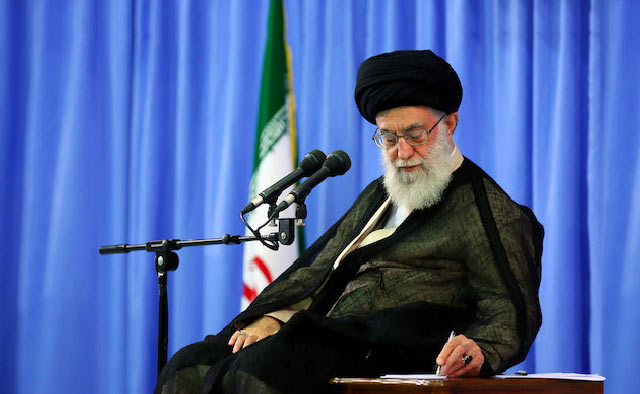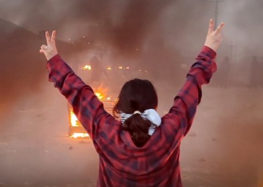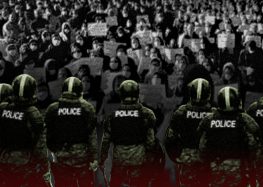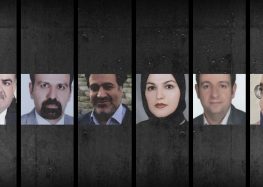Commentary: Khamenei’s New Letter to Western Youth is Case Study in Hypocrisy

Seyed Ali Khamenei, Iran’s supreme leader, has written a letter addressed to youths in Western countries and, as he did in an earlier similar letter, he scolded the West on a number of issues of which the Islamic Republic is itself woefully guilty. His preaching has thus resulted in far more scrutiny of his hypocrisy inside Iran than any discernible impact on its intended audience in Europe and the United States.
Both letters were written shortly after jihadist terrorist attacks in Paris. While Khamenei has claimed his aim has been to challenge young people in the West to learn about Islam without filters and beyond the violence done in the name of Islam, in his second letter he described the West through his own filters and said “aggression” and “moral promiscuity” had become the main elements of Western culture.
In his first letter, Khamenei asked, “Have you [Western youth] ever asked yourself how and on the basis of which values has Islam established the greatest scientific and intellectual civilization of the world and raised the most distinguished scientists and intellectuals throughout several centuries?” But he did not ask why Islam no longer led the world in intellectual or scientific achievements, or why the “aggressive” and “morally promiscuous” Western civilization had become so advanced in science.
Khamenei, in his first letter, also reminded Western youths of the bloody history of their governments and wrote: “The histories of the United States and Europe are ashamed of slavery, embarrassed by the colonial period and chagrined at the oppression of people of color and non-Christians. Your researchers and historians are deeply ashamed of the bloodsheds wrought in the name of religion between the Catholics and Protestants or in the name of nationality and ethnicity during the First and Second World Wars.”
Khamenei added that the West’s self-critical approach was “admirable” but asked “why the public conscience in the West awakens and comes to its senses after a delay of several decades or centuries?”
DISSECTING A LETTER
Khamenei attacks the West for its history of slavery as if Eastern societies themselves were not involved in the same evil practice. He forgets that in many of today’s religious treatise by Shia scholars, including his own, there are references that confirm the ugly fact that slavery still exists in the East. Indeed, one of these includes the reference that the penances for deliberately avoiding fasting is to “free a slave.”
Moreover, some senior Shia figures in Iran still openly support the concept of slavery. Ayatollah Mesbah Yazdi, who is one of Khamenei’s closest allies, has explicitly declared slavery as legitimate under Islam “in the battle of Good and Evil.”
In his essay titled “A Glance at Human Rights in the Eyes of Islam,” Yazdi adds: “One can take prisoners at the end of a fair battle. Slavery is not determined by race or skin color. But if a person rises against Islam and the Just Islamic State, that person can be made a slave in the interest of the Islamic Nation.”
Are these views on slavery not similar to those practiced by ISIS?
Moreover, how can Khamenei attack the West for the “oppression of people of color and non-Christians” when the Islamic Republic of Iran continues to deny ethnic and religious minorities their basic rights and engage in the severe and systematic persecution of these groups? Is he not ashamed of the widely documented reports, and UN condemnations of, the Islamic Republic’s mistreatment of Iranian Baha’is, Christians, Jews, Sunni Muslims, Sufis and Dervishes? As well as Azeris, Kurds and Arabs?
In July 2013, Karen Khanlarian, one of the representatives of the Armenian Christian community in the Iranian Parliament, warned that the number of Christians in Iran had gradually decreased and was now only “about 60,000 to 70,000 people.” He estimated that in recent years more than a hundred thousand Christians had emigrated to other countries. They have not been leaving Iran for milder climates; rather, Iranian Christians have been fleeing egregious and routine persecution.
At the same time Iran’s Jewish population has gone down sharply as well. According to one study, there were 150,000 Jews living in Iran in 1979. In 2010 that number had fallen to 30,000.
As recognized religious minorities in Iran’s constitution, Christians and Jews have fared better than others. And yet their population continues to shrink because of persistent harassment from official quarters. The latest example was on August 7, 2015, when eight Christian converts were arrested at a church inside a home in Karaj. A few months earlier, in May 2015, 18 Christian converts were sentenced to a total of 23 years in prison.
In his second letter, Khamenei repeated accusations made in his first letter about Western atrocities in the Middle East and wrote: “What kind of atrocious violence today is comparable to that of the settlement constructions of the Zionist regime? This regime, without ever being seriously and significantly censured by its influential allies or even by the so-called independent international organizations, everyday demolishes the homes of Palestinians and destroys their orchards and farms. This is done without even giving them time to gather their belongings or agricultural products and usually it is done in front of the terrified and tear-filled eyes of women and children who witness the brutal beatings of their family members who in some cases are being dragged away to gruesome torture chambers. In today’s world, do we know of any other violence on this scale and scope and for such an extended period of time?”
Khamenei’s criticism of the Israeli government’s treatment of Palestinians is disingenuous and hypocritical when one looks at the Islamic Republic’s cruel and discriminatory behavior towards Baha’is, including the destruction and confiscation of their homes, shops and even cemeteries. Baha’i students have been denied entry into universities. Dozens of the faith’s followers have been given long prison sentences based on false charges. Many Baha’is have even received death sentences simply because of their religious beliefs.
On June 29, 2010, fifty homes belonging to Baha’i families were burned in the village of Ivel in Mazandaran Province. And in April of this year, Jamaleddin Khanjani’s family home in Dazgareh Afshar village, Semnan Province, was demolished. Khanjani is one of seven Baha’i leaders imprisoned since 2008.
KHAMENEI’S VIEW OF WESTERN CULTURE
In his latest letter, Khamenei once again touched on one of his pet peeves, that being the West’s cultural aggression. “I consider the imposition of Western culture upon other peoples and the trivialization of independent cultures as a form of silent violence and extreme harmfulness,” he wrote.
Khamenei did not explain how the West can be accused of actively imposing its culture, or how it can be stopped. But he expressed concern that with the use of advanced tools the West “is insisting on the cloning and replication of its culture on a global scale.”
Ironically, it is the Islamic Republic itself that has been trying to impose a singular culture on the entire Iranian multi-cultural, multi-religious, and multi-ethnic population in the name of its strict interpretation of Shia Islam. The daily harassment of women, arresting scores of journalists, writers, labor leaders and artists, canceling concerts, banning musicians and filmmakers, imprisoning peaceful activists and dissenters, and widespread state censorship are all attempts at imposing an ideological monopoly on the Iranian people. Is that not what Khamenei is accusing the West of?






